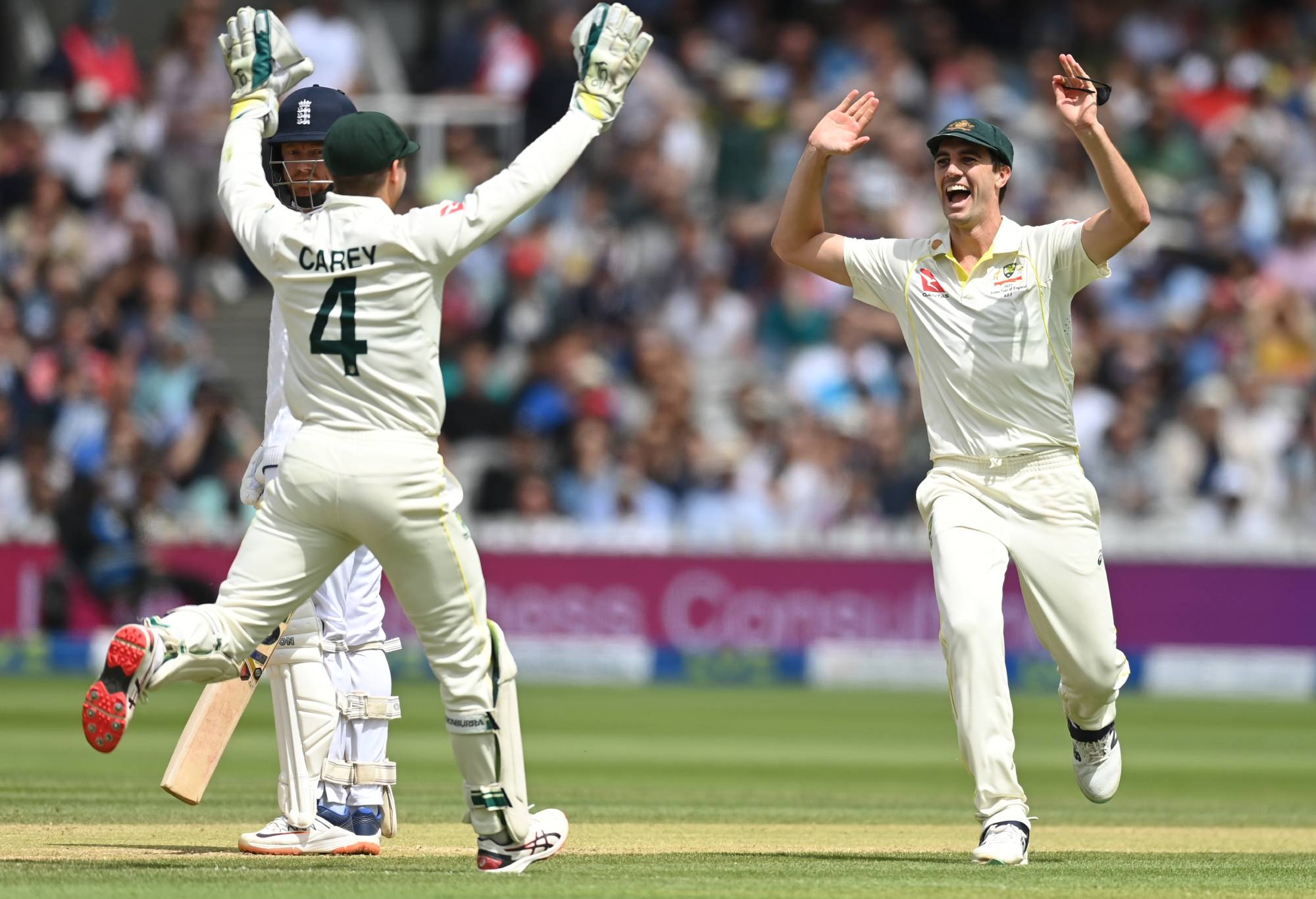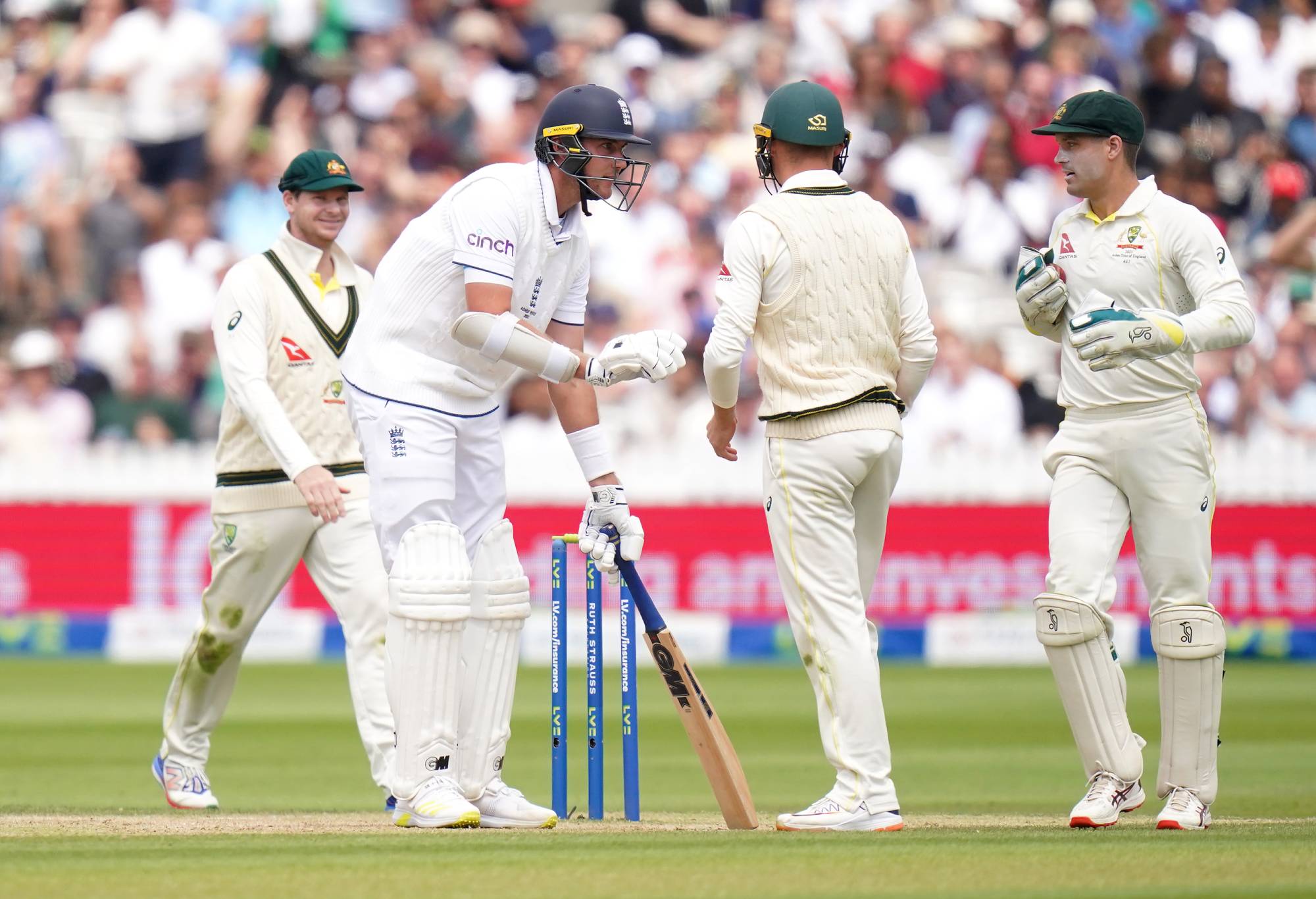Pat Cummins is supposedly Public Enemy No.1 but don’t believe the hype – the Australians have nothing to apologise for and England can only blame themselves for losing the second Ashes Test.
Just like the first match, they repeatedly cruelled their chances of victory and they can whinge all they want about the Jonny Bairstow dismissal but in reality, it was not even close to the deciding factor when you look at the Test over five days.
And since Australia completed their thoroughly-deserved 43-run triumph at Lord’s, we have had to put up with sanctimonious drivel spouted by Brendon McCullum, Stuart Broad, Ben Stokes, former players, columnists with an axe to grind and even the British Prime Minister looking to score a few cheap votes.
Past incidents like the Cape Town ball-tampering scandal five years ago and the underarm bowling incident of 1981 have been brought up to propagate the “same old Aussies, always cheating” narrative which appeals to the lowest common denominator of fans, which can not only be found in the outer ground but the Long Room as well.
The ethereal “spirit of cricket” has been brought up with critics suggesting Cummins should have recalled Bairstow after Alex Carey pulled off a perfectly legitimate stumping when he wandered out of his crease.

Pat Cummins and Alex Carey celebrate the wicket of Jonny Bairstow. (Photo by Gareth Copley/Getty Image
Bairstow would be better served worrying about the “laws of cricket”, particularly Law 20.1.2 which decrees “the ball shall be considered to be dead when it is clear to the bowler’s end umpire that the fielding side and both batters at the wicket have ceased to regard it as in play.”
Carey used an underarmed method but his motive was not underhanded.
Bairstow clearly thought it was a legitimate dismissal right up until the millisecond before Carey’s ping hit the stumps because he employed the same tactic in trying to get Marnus Labuschagne earlier in the very same match.
Not for the first time this series, Bairstow’s hands let him down because his throw was well wide of the stumps, missing by at least a metre.
Labuschagne’s feet were well behind the crease anyway, just as Bairstow’s were when Carey let the ball go before England’s No.7 carelessly wandered out of his ground.
If Carey’s throw had missed the stumps and rocketed into the outfield or ricocheted well away from fielders, would Bairstow and Stokes have declined the opportunity to take an overthrow or two?
Travis Head claiming that Bairstow told him “bloody oath I would” run him out in a similar situation says it all.
Bairstow is the one who should be castigated for letting his team down at a crucial moment. It wasn’t quite in the same category as Herschelle Gibbs’ post-catch celebration at the 1999 World Cup which butchered a straightforward Steve Waugh dismissal but it’s in the same ballpark of costly carelessness.

Ben Stokes speaks to the umpires after Jonny Bairstow was run out. (Photo by Ryan Pierse/Getty Images)
What happened to accepting the umpire’s decision?
The Aussies accepted the umpire’s decision when Mitchell Starc’s catch was overturned the previous day but the England team, and the MCC members, conveniently ignored this intrinsic part of cricket’s ethos.
It’s ludicrous to suggest Bairstow’s dismissal cost England the match. They were still an improbable 178 runs from the victory target.
And then Broad tried to inflame the situation during his innings with his theatrics, placing his bat behind the bowling crease near the base of the stumps at the end of each over, asking the Australians and umpires with a deadpan expression if it was OK to wander out of his ground.
He then had the temerity to sledge Carey that the incident was all he’s going to be remembered for and it was “literally the worst thing I’ve seen in cricket”.
Literally is an overused word when people are speaking figuratively. Broad in that moment applied it correctly when he claimed it was literally his belief but there needs to be a new hypocrisy entry into the Laws of Cricket which deem “any player who has nicked off to slip and refused to walk is not entitled to comment on the ethics of any player ever again”.
Broad had the skills to be an all-rounder early in his career – he smashed a ton in 2010 and could have ended up a permanent No.7 but was never the same as a batter after copping a broken nose from a bouncer four years later.
His glaring weakness is the short ball and the Aussies exploited it, sending several thunderbolts into his arms and upper body but he showed rare resilience to withstand the blows in his 108-run partnership with Stokes.

England’s Stuart Broad grounds his bat as Australia’s Marnus Labuschagne and Alex Carey look on. (Photo by Adam Davy/PA Images via Getty Images)
Broad deserves credit for his courage under Aussie fire but as much as he might want to claim this is a void result after the fact, just like the 4-0 drubbing in Australia he tried to write off, the reality is this result also can’t be disregarded with smarmy comments after the fact.
McCullum has fostered that petulance in the Bazball era. He told the players it felt like a win after they had lost the series opener in Birmingham which prompted Ollie Robinson and Zak Crawley to shoot their mouth off before the Lord’s return fixture.
The England coach conceded the Bairstow incident was out but added “I just question that Jonny wasn’t looking to try and take a run”.
“He felt as if the umpires had intimated that it was over and the evidence backs that up.”
Rubbish. Bairstow stuffed up. Whether it was the last ball of the over or any delivery earlier, the ball was still live.
McCullum addressed an incident from his playing days when he ran out Sri Lankan tailender Muttiah Muralitharan while keeping wicket for in a Test for New Zealand.
Poor old Murali was walking back up the pitch to congratulate Kumar Sangakkara after they had run a single to bring up his hundred but McCullum whipped off the bails.
“Obviously I’ve made an apology to Murali in my Cowdrey Lecture,” he said. “When I was a younger man I didn’t quite understand the significance of what the spirit of the game means to the game. “
That’s all well and good to apologise for what was a much more dubious act than Carey’s stumping. But his apology was delivered in a speech in 2016, the match was in 2006. There was no recall from McCullum or Black Caps captain Stephen Fleming at the only time that mattered – on the ground.
His dismissal closed the innings at Christchurch to leave the home side a fourth-innings chase of 119 which they reached five down.
“The whole team is disappointed,” Sri Lanka skipper Mahela Jayawardene said. “Legally it was run out, the ball was alive but we play in an age where we talk about the spirit of the game. Hopefully it won’t happen again. It’s not the way to play cricket.”
Fleming countered with “you can’t just wander off when the ball’s in mid-air and if we’d had an overthrow I’m sure they would have taken that. To my mind the ball’s still alive. Certainly in the cut-throat environment of this competition it’s a mistake you can’t afford to make on their behalf.”
Sounds very familiar.
England only have themselves to blame, again
Hypocrisy aside, if McCullum wants to show that he literally is a great coach, he needs to rein in England’s tactics.
To paraphrase Australia’s captain Bill Woodfull from the 1932-33 Ashes, there’s two teams out there and only one of them is playing Test cricket.
England playing at full throttle attack is helping them compete with a much stronger Australian line-up but it’s costing them two Tests in a row now because they can’t temper their aggression, especially when batting.
Careless shots when the team was in a strong position were the reason they lost this Test, particularly in the first innings when Zak Crawley, Harry Brook and Bairstow gifted their wickets to the Aussies who couldn’t believe their luck.

(Photo by Visionhaus/Getty Images)
They were cruising at 1-188 in their first innings before falling for the trap of trying to take on the bouncers from the Aussie quicks. There’s a not so fine line between living up to their pledge of entertaining the crowds and being foolhardy.
“Those shots weren’t entertaining,” former Australian keeper Brad Haddin said on the Willow Talk podcast. “Everyone getting out to the same plan when the game was there to be won. That’s not entertainment, that’s just reckless cricket.”
The English fans would be more entertained by a win than a few slogs over the boundary.
Even Kevin Pietersen can see that England are getting too full of themselves, blasting them for “acting like they’re the greatest team around”. Unusual times when he is England’s relative voice of sanity amid the madness.
Their pop-gun attack failed to make the most of the favourable bowling conditions on day one. In both Tests they have won the toss yet wasted that advantage to let Australia get the upper hand.
The Aussies were without Nathan Lyon due to injury for the second innings and yet despite Stokes’ fantastic 155, the home side still couldn’t get the job done.
If the Bazball era is all about daring to be different, going into a Test with five right-arm medium to medium-fast seamers and Joe Root bowling off-spinners is hardly revolutionary.
At least Josh Tongue had a bit of pace about him.
England’s Bazball batters are flat-track bullies but those made-to-measure wickets have reduced swing wizard James Anderson to a bit player, probably hastening his retirement.
Even though he’s 41 at the end of the month, he’s been one of the world’s best bowlers in Test cricket over the past couple of years but whether it’s the placid pitches or the inevitability of time, he’s looked pedestrian this series.
Dropping a few straightforward catches is also another bad sign for Anderson’s hopes of continuing his extraordinary career.
Broad is still venomous, figuratively, as a bowler but Robinson talks a good game without doing much else.
If you remove all the bluff and bluster that’s engulfed this series, it’s clear to see England have improved but their actions, not anyone else’s, are the main reason they’re 2-0 down and staring down the barrel of a potential home whitewash.
































































































